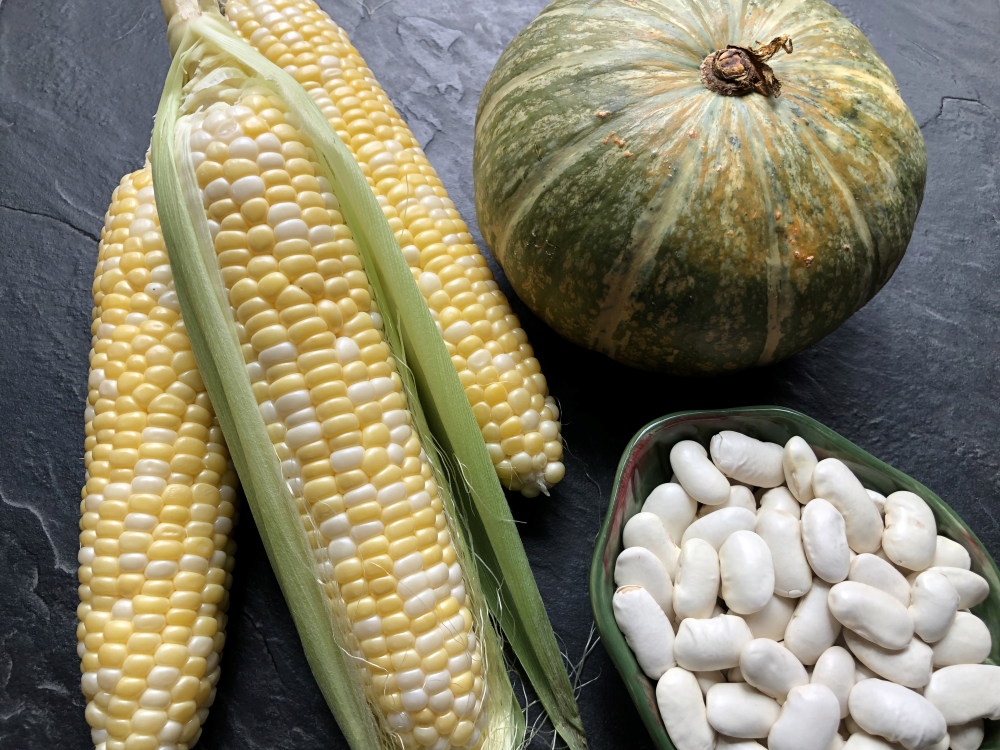Cook! For Goodness Sake!
Indigenous Wisdom in the Kitchen
By Linda Garrettson
It’s October and Christopher Columbus is out, Indigenous people are in. I don’t mind remembering the guy who made all those voyages across the sea when they thought the world was flat, or the fact that he might not have discovered America. My only gripe with Columbus is that he doesn’t inspire me when it comes to food. But Indigenous people, now you’re talking.
What a joy it has been to read “Braiding Sweetgrass,” by Robin Wall Kimmerer, a scientist, professor, and member of the Citizen Potawatomi Nation. With her elegant writing style, deep understanding of botany, and appreciation for the legends of her ancestors, she is able to weave that knowledge into wisdom for the ages.
Kimmerer writes, “I hold in my hand the genius of Indigenous agriculture, the Three Sisters. Together these plants—corn, beans, and squash—feed the land, and feed our imaginations, telling us how we might live.” When planning my article for this month, my first thought was of the Three Sisters.
As the story goes, Indigenous people planted the three seeds in a mound, much to the dismay of the early colonists, who planted everything in rows. The corn was the first to push up through the soil, taking on water. Next came the climbing beans that used the corn in lieu of poles. Squash, the slow grower, spread out under the corn and beans, holding the moisture and discouraging garden pests with their prickly leaves and vines.

Photo by Linda Garrettson.
The process, though complex botanically, is simple in concept. Corn turns sunshine into carbohydrate that can be stored for energy in winter months. Beans are high in protein and convert sunlight into nitrogen and then convert it to essential nutrients. But the two are incomplete without the carotene-rich squash necessary to make a complete food.
I invite you to be as inspired by that wisdom and the legends of these original people as I am. Enjoy these recipes. I enjoyed not only creating them but feeling closer to nature and the cultures who best understand it.
Three Sisters Soup
Ingredients:
1 medium onion, diced
2 cups kabocha squash peeled, seeded and diced (almost any squash will suffice)
1-2 15 oz. cans of low salt cannellini beans, drained and rinsed (great northern or navy beans work as well)
3-4 ears of fresh corn, shucked and grated
2 cups low sodium vegetable broth, more if needed
½ tsp. sea salt, more if needed
1 tsp. ground cumin
½ tsp. dried thyme
½ tsp. dried sage
3-4 tbsp. of finely chopped Italian parsley
Method:
• Steam the squash for 20 minutes or until tender. Set aside.
• Add a few tablespoons of vegetable broth and the onions to a soup pot and sauté for 5-7 minutes.
• Add the vegetable broth, beans, squash, corn and sea salt. Stir to combine.
• Bring to a gentle boil and simmer on low heat for 15-20 minutes.
• Add the cumin, sage and thyme, simmer for an additional 5-10 minutes.
• Garnish with the fresh parsley and serve.
Yield 6 cups
Note. I made this dish with dried gigantic lima beans. To cook, soak 1 cup of rinsed lima beans overnight in 6 cups of water and a piece of dried kombu seaweed. The next day drain and rinse the lima beans, discard the kombu, and add to a pot with 6 cups of fresh water. Bring to a boil, lower the heat, and simmer for an hour or more. The bite test will tell you when they are cooked—the softer the better. (1 cup of dried beans yields 3 cups of cooked beans.)
Three Sisters Burger
Ingredients:
1 tbsp. ground flaxseed + 3 tbsp. water
1 15 oz. can of “no salt added” black beans, drained and rinsed
2 cups of butternut, kabocha or acorn squash, peeled, seeded, and diced
1 cup of grated fresh corn, or whole cooked kernels cut off the cob (can substitute frozen or canned)
¾ cup masa harina or finely ground cornmeal
2 tsp. ground cumin
¼ cup chopped fresh Italian parsley
1 tsp. sea salt
Method:
• Steam the squash for 20 minutes or more, until soft. Set aside.
• Stir the flaxseeds into the water and set aside for several minutes.
• Mash the black beans in a large mixing bowl, keeping some beans whole.
• Mash the cooked squash into the beans.
• Add the corn and combine well.
• Stir in the masa harina and flaxseeds, continue to mix well.
• Add the cumin, parsley and sea salt.
• Mix all ingredients with your hands until well blended. Form into 6 small patties or 4 large. Dust with a little cornmeal.
• Line a baking tray with parchment paper and bake at 400º for 12-15 minutes. Flip the burgers and continue to bake for an additional 8-10 minutes.
Serve on your favorite whole grain bun with plant-based mayo, mustard, a slice of tomato, fresh greens, pickles, onions, or any of your favorite burger toppings. This may be my favorite burger ever.
